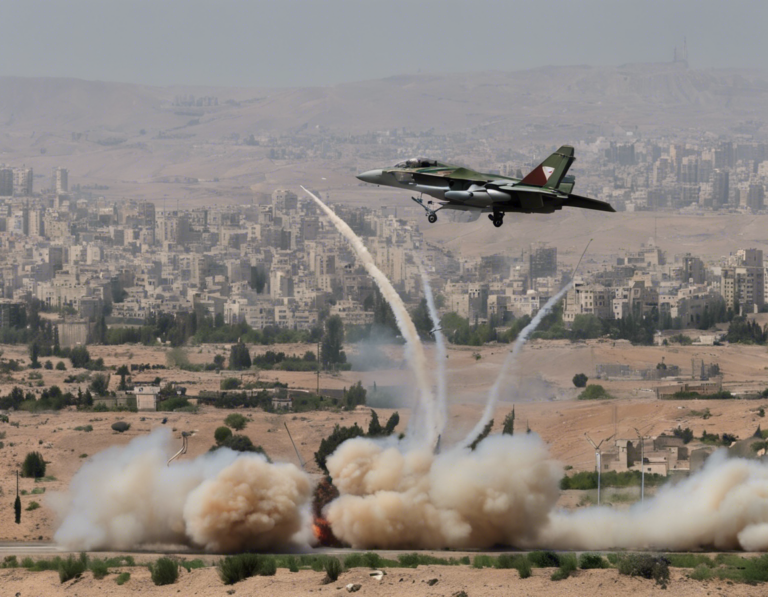
In recent years, Iran has emerged as a significant player in the Middle East, with its involvement in various conflicts and disputes across the region. One particular area where Iran’s influence has been a cause for concern is its actions against Israeli sovereignty. The relationship between Iran and Israel has been fraught with tension, and Iran’s support for various militant groups in the region has raised alarms in Israeli security circles. In this article, we will delve deeper into Iran’s attacks on Israeli sovereignty, exploring the background of the conflict, tactics employed by Iran, and the consequences for the region as a whole.
Background: Iran and Israel
The hostility between Iran and Israel can be traced back to the Islamic Revolution in Iran in 1979 when the new regime led by Ayatollah Khomeini adopted an anti-Israel stance. Iran’s support for Palestinian militant groups such as Hamas and Hezbollah has been a major point of contention for Israel. Iran’s leaders have repeatedly called for the destruction of Israel, and their actions in the region have been seen as a direct threat to Israeli security.
Tactics Used by Iran Against Israeli Sovereignty
Iran has utilized a variety of tactics to undermine Israeli sovereignty and security. One of the most significant ways in which Iran has done this is through its support for militant groups that operate near Israel’s borders. Hezbollah in Lebanon and Hamas in Gaza are two key beneficiaries of Iran’s support, receiving financial backing, weapons, and training from Tehran. These groups have carried out attacks against Israel, leading to cycles of violence and conflict in the region.
In addition to supporting militant groups, Iran has also sought to establish a military presence close to Israel’s borders. The Syrian civil war provided Iran with an opportunity to deploy its forces in Syria, posing a direct threat to Israel. Iranian Quds Force and their proxies have been involved in various activities in Syria, including weapons transfers to Hezbollah and attempts to establish a permanent military presence in the country.
Consequences for the Region
The actions of Iran against Israeli sovereignty have had far-reaching consequences for the region as a whole. The ongoing conflict between Israel and Iranian-backed groups has led to multiple flashpoints and escalations in the region, raising the specter of a broader conflict. The presence of Iranian forces in Syria has also exacerbated tensions, with Israel carrying out airstrikes to prevent the transfer of advanced weapons to Hezbollah.
Moreover, Iran’s actions have fueled sectarian tensions in the region, with its support for Shiite militant groups further deepening the divide between Sunni and Shiite populations. This has added another layer of complexity to an already volatile region, increasing the risk of proxy conflicts and instability.
Frequently Asked Questions (FAQs)
1. Why is Iran hostile towards Israel?
Iran’s hostility towards Israel dates back to the Islamic Revolution in 1979, with the new regime adopting an anti-Israel stance and calling for the destruction of the country.
2. What role do Hezbollah and Hamas play in Iran’s strategy against Israel?
Hezbollah in Lebanon and Hamas in Gaza are key beneficiaries of Iran’s support, receiving financial backing, weapons, and training to carry out attacks against Israel.
3. How has the conflict between Iran and Israel impacted the region?
The conflict has led to multiple escalations and flashpoints in the region, raising the specter of a broader conflict and fueling sectarian tensions.
4. What is Iran’s military presence in Syria and how does it affect Israel?
Iran has deployed its forces in Syria, posing a direct threat to Israel and engaging in activities such as weapons transfers to Hezbollah.
5. What are the consequences of Iran’s actions against Israeli sovereignty for regional stability?
Iran’s actions have deepened sectarian tensions, increased the risk of proxy conflicts, and added to the instability in an already volatile region.
In conclusion, Iran’s attacks on Israeli sovereignty represent a significant challenge to regional stability and security. The support for militant groups, the establishment of a military presence near Israel’s borders, and the broader implications for the region underscore the complexity of the conflict. Addressing these issues will require a concerted effort from the international community to prevent further escalations and promote dialogue and diplomacy in resolving the underlying grievances between Iran and Israel.